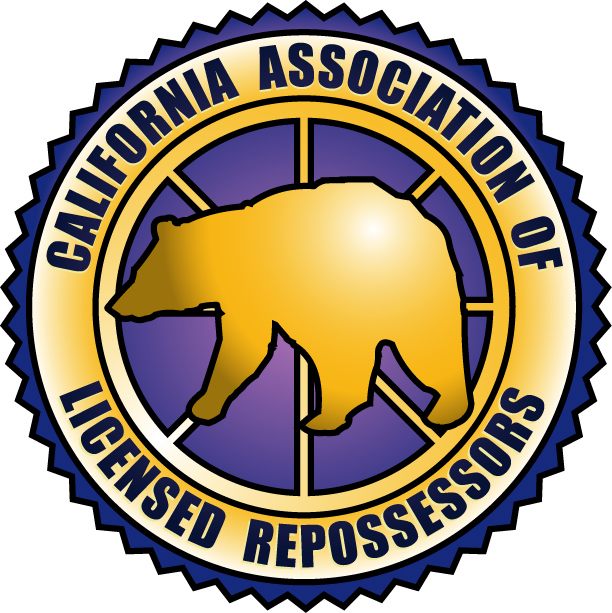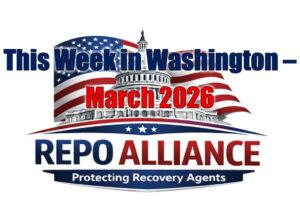
The day before AB 2501 went to vote, the California Association of Licensed Repossessors (CALR) sent a letter of opposition that perfectly articulated the negative aspects of this bill to the public. The bottom line is probably the most compelling.
June 14, 2020
The Honorable Monique Limón
State Capitol, Room
Sacramento, CA 95814
Re: AB 2501 (Limón)
Position: OPPOSE
The California Association of Licensed Repossessors (CALR) Opposes your bill, AB 2501 as amended June 10, 2020. The bill is intended to provide homeowner, tenant, and consumer relief to Californians suffering from the impact of the COVID-19 Pandemic. As such, CALR wants to help vulnerable consumers and work to find appropriate relief which provides reasonable consumer protections to vehicle loan borrowers who are impacted by job loss, job retractions, stay at home orders, and challenges presented by the medical impacts of COVID-19.
However, as amended, the bill would prohibit, as specified, any lender from self-help repossession of a mobile home or vehicle until January 1, 2023 – 2 1/2 years from now. The bill would instead require lenders to use a judicial process, in which the courts and the police are involved to repossess vehicles. Under current law, self-help is the term for lenders to repossess a vehicle in default under the terms of the lending contract, and does not require the intrusive costs, and judicial processes of using the courts and police to repossess a vehicle.
Judicial Process Repossession.
By requiring a judicial process for repossessions, the bill would:
• Require a lender to take consumers to court when they are behind on their car payments
• If the consumer fails to appear in court a bench warrant may be issued
• Consumers are responsible for all judicial process costs
• Requires law enforcement to go to your home or work to repossess your car
• There is no breach of the peace protection for the consumer
• There is no oversight for law enforcement repossessions
• Judicial process attorney and court costs run from $3,500 to $4,500
• Judicial process to involve law enforcement costs $1,200 to $1,500
• Judicial process repossession costs $5,000 to $6,000
All of these costs are ultimately charged to the consumer.
After the judicial repossession process is completed:
• Judgments stay on the consumer’s public court record for 10 years
• The judgment will stay on the consumer’s credit report for seven years
• Liens may be issued against the consumer’s assets including retirement, 401k, etc.
• The consumer does not have the right to redeem or reinstate their loan.
Self Help Repossession—
The CURRENT REPOSSESSION PRACTICE:
• The consumer has up to 25 days to redeem or reinstate their loan
• The consumer has up to 60 days to pick up their personal effects
• Non-Judicial repossession costs approximately $350
• Repossessors are regulated by the Department of Consumer Affairs
The bottom line is this: If lenders must use a judicial process for repossessions, those lenders will be unwilling to extend financing to lower income, economically disadvantaged California workers who need to purchase a vehicle to go to their jobs. It will further make repossession in communities that are made up of the economically disadvantaged, minorities and people of color an action by the police.
For these reasons, CALR is strongly Opposed to AB 2501 as amended on June 10.
If you have any questions, please don’t hesitate to contact me. 
Sincerely,
Joe Collins
CALR Legislative Liaison
cc: Members, California State Assembly
CALR Drafts Opposition Letter to AB 2501 – CALR Drafts Opposition Letter to AB 2501 – CALR Drafts Opposition Letter to AB 2501 – CALR Drafts Opposition Letter to AB 2501 – CALR – CALR –
Repossession History – CUCollector – Repossession – Repossess – Repossession – Repossession Agency – Repossessor










More Stories
Repo Alliance – This Week in Washington – March 2026
Royal Key Supply Announces Kevin Zwahlen as Account Executive – Repossession Sector
CALR Meets with State Repossession Regulators
Powering Smarter Recoveries, Vendor Safety and Faster Workflows
Take the Survey: Tell RDN What Recovery Pros Need Most
One Year Later: How Real-Time Communication Is Keeping Recovery Agents Safer